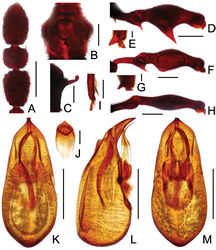Labomimus fimbriatus
| Notice: | This page is derived from the original publication listed below, whose author(s) should always be credited. Further contributors may edit and improve the content of this page and, consequently, need to be credited as well (see page history). Any assessment of factual correctness requires a careful review of the original article as well as of subsequent contributions.
If you are uncertain whether your planned contribution is correct or not, we suggest that you use the associated discussion page instead of editing the page directly. This page should be cited as follows (rationale):
Citation formats to copy and paste
BibTeX: @article{Yin2013ZooKeys275, RIS/ Endnote: TY - JOUR Wikipedia/ Citizendium: <ref name="Yin2013ZooKeys275">{{Citation See also the citation download page at the journal. |
Genus: Labomimus
Name
Labomimus fimbriatus Yin & Hlaváč sp. n. – Wikispecies link – ZooBank link – Pensoft Profile
Type material
(7 ♂♂, 6 ♀♀). Holotype: ♂, labeled ‘CHINA: Yunnan, Lushui County / Pianma Town, Gaoligongshan Mt. / 25°58'46"N, 98°40'33"E, 3000 m, / (mixed leaf litter, sifted) / 2012.vi.24, Liang Tang leg. (SNUC). Paratypes: 1 ♂, same label data as holotype (SNUC); 2 ♂, 3 ♀♀, labeled ‘CHINA: Yunnan [CH07-24], Nujiang / Lisu Aut. Pref., Gaoligong Shan, valley 18 / km W Gongshan, 3020 m, 27°47'54"N, 98°30'13"E, mixed forest, litter, moss, / wood sifted, 7.VI.2007, M. Schülke’ (pcMS, SNUC); 1 ♀, CHINA: Yunnan [CH07-26], Nujiang / Lisu Aut. Pref., Gaoligong Shan, pass 21 / km NW Liuku, 3150 m, 25°58'22"N, 98°41'00"E, bamboo with shrubs, litter / sifted, 9.VI.2007, M. Schülke’ (pcMS); 1 ♀, same label data, except ‘25°58'49"N, 98°41'48"E’ (SNUC); 1 ♂, labeled ‘CHINA: Yunnan, Nujiang Lisu Pref., / Gaoligong Shan, “Cloud pass”, / 21 km NW Liuku, 25°58'21"N, 98°41'01"E, 3150 m, shrubs & / bamboo, litter sifted, 3.IX.2009, leg. M. Schülke [CH09-22a]’ (SNUC); 1 ♂, 1 ♀, same label data, except ‘2.IX.2009 D. W. Wrase [22A]’ (SNUC); 1 ♂, labeled ‘CHINA (Yunnan) / Nujiang Lisu Aut. Pref., / Gaoligong Shan, creek valley / 20 km NW Liuku, 3000 m, / 25°58'49"N, 98°41'48"E / (bamboo, shrub, litter sifted) / 9.VI.2007 D.W. Wrase [27]’ (pcMS).
Diagnosis
Reddish brown; length 3.47–3.77; postgenae rounded laterally; antennomeres IX–XI enlarged; IX modified in male; pronotum roundly expanded at anterolateral margins; male with long curved metaventral processes; metacoxae simple; aedeagus with symmetric median lobe.
Description
Male (Fig. 1B). Length 3.52–3.77. Head slightly longer than wide, HL 0.70–0.72, HW 0.60–0.65; eyes each composed of about 30 facets. Antennal clubs as in Fig. 3A. Pronotum (Fig. 3B) slightly longer than wide, PL 0.70–0.71, PW 0.65–0.69, roundly expanded at anterolateral margins. Elytra wider than long, EL 0.87–0.92, EW 1.22–1.26. Metaventral processes (Fig. 3C) long, curved anteriorly at apices. Procoxae, protrochanters and profemora spinose at ventral margin (Fig. 3D), protibiae with distinct triangular apical projection (Fig. 3E); mesotrochanters with large ventral spine, mesofemora roundly broadened ventrally (Fig. 3F), mesotibiae with small apical tubercle (Fig. 3G); metatrochanters and metafemora (Fig. 3H) simple, metatibiae with setose tuft near apices (Fig. 3I). Abdomen broad at base and narrowed apically, AL 1.25–1.42, AW 1.29–1.37. Sternite IX as in Fig. 3J. Aedeagus length 0.75, with symmetric median lobe (Figs 3K–M).
Female. Similar to male in general; BL 3.47–3.65, HL 0.73–0.76, HW 0.62–0.63, PL 0.70–0.72, PW 0.64–0.65, EL 0.74–0.75, EW 1.25–1.32, AL 1.30–1.42, AW 1.37–1.47. Eyes each composed of about 30 facets. Antennae not modified; metaventral processes absent.
Comparative notes
This species is close to Labomimus jizuensis and Labomimus simplicipalpus (both described below) in sharing similar modifications of the antennae and legs. Labomimus fimbriatus and Labomimus simplicipalpus share a symmetric aedeagal median lobe. The two species can be separated by the larger size, nearly symmetric antennomeres X, and more slender aedeagus in Labomimus fimbriatus, while Labomimus simplicipalpus is much smaller in size, has strongly asymmetric antennomeres X, and the aedeagus is more robust. Labomimus jizuensis can be separated from both former species by the clearly asymmetric aedeagal median lobe.
Distribution
Southwest China: Yunnan.
Biology
Adults were commonly sifted from mixed leaf litter in shrubs and forests and are abundant in litter from appropriate habitats.
Etymology
The Latin word ‘fimbriatus’ means ‘having a fringe, fringed’, referring to the fringed apical portion of the metatibiae of the new species.
Original Description
- Yin, Z; Hlaváč, P; Li, L; 2013: Further studies on the Pselaphodes complex of genera from China (Coleoptera, Staphylinidae, Pselaphinae) ZooKeys, 275: 23-65. doi
Images
|

